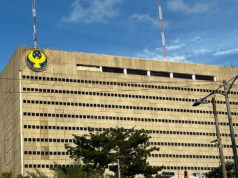Senate body finalizing bill raising tobacco tax
THE SENATE Ways and Means committee aims to report for plenary action by Feb. 6 the bill further increasing excise taxes on tobacco products before Congress takes its Feb. 7-May 19 break.
“We’re looking to sponsor it by next week… But I think the process is also important so we need to hear those who were not able to speak today so I think that’s what Monday’s hearing is for,” committee chair Senator Juan Edgardo M. Angara told reporters after the hearing on the bills seeking to increase tobacco excise tax.
“Hopefully we can sponsor it by Wednesday [next week]… The goal is to sponsor it before Congress (adjourns),” Mr. Angara added, noting “there are still three weeks of session after the break, so that is the time for plenary debate.”
Senators on Tuesday deliberated the “sweet spot” in raising the excise tax on tobacco products that will ensure bigger collections while discouraging more people from smoking.
Mr. Angara told reporters that the committee has yet to agree on a final amount for increased tobacco excise tax rate as it awaits the Department of Health’s (DoH) spending plan for the universal healthcare program.
“It’s still early to say because what we’re doing is, we were looking at it not just from the revenue side, but also the spending side. We don’t want funds to be wasted,” he said.
“I think, realistically, it’s between P37.50 and P90. That’s the universe. I will consult with my colleagues, I will read position papers.”
The DoH and the Department of Finance (DoF) jointly proposed higher tobacco excise tax rates of at least P60 per pack from P35 currently, similar to Senator Emmanuel D. Pacquiao’s Senate Bill No. 1599.
House Bill No. 8677, which bagged third-reading approval last Dec. 3, provided a higher P37.50 per pack tobacco tax rate.
Senator Joseph Victor G. Ejercito’s Senate Bill No. 1605 proposes an increase to P90, while Senator Sherwin T. Gatchalian’s Senate Bill No. 2177 sets it at P70 per pack.
Asked by Messrs. Gatchalian and Ejercito on the “optimal amount” of tobacco excise tax rate that will hike government revenues, Finance Undersecretary Karl Kendrick T. Chua said P73 would not affect demand too much that collections would fall. “Is P60 the optimal?” Mr. Gatchalian asked, to which Mr. Chua replied: “I was told by my staff that up to P73 per pack ‘yung hindi magre-reverse (will not unduly reverse collections)…”
However,Isabela Vice-Governor Antonio T. Albano, retailers and sari-sari store owners raised concern that higher tobacco taxes will disrupt livelihoods, including that of farmers.
“We are appealing because we just had the TRAIN law last 2018 [that raised taxes]… and here we are again,” Mr. Albano said, referring to the first tax reform package that took effect a year ago.
“The farmers are greatly affected and we can see the studies that there was a reduction in tobacco growers already because of the effects of the imposition of taxes. Therefore, we appeal to the good senators… maybe later on, we can further study whether or not we should impose such taxes. But at this moment, tobacco farmers are really the ones affected. We’re talking about tens of thousands of families,” Mr. Albano said.
“Now for the retailer side, because of the low margins we attach to cigarettes in particular and the high cost of inventory for cigarettes, some retailers might be having second thoughts on carrying cigarettes… The manufacturers and the employees of these establishments will be hard hit. If there would be less supermarkets carrying cigarettes, it will do harm to the industry quicker than we think because of higher taxes,” said Philippine Amalgamated Supermarkets Association, Inc. Steven Cua.
For her part, Catherine Calag of the Philippine Association of Stores and Carinderia Owners (PASCO) raised concerns that some sari-sari stores may close due to the higher taxes. “We are really affected. Our income from our stores is no longer enough to support our families… The higher taxes might help government, but we hope it will also help us,” she said in Filipino. — Camille A. Aguinaldo



